- Our eyes: Our window to the world
In this article, you will learn more about your beautiful eyes. This article will explain to you how the eyes work and what is present inside them that helps us to see.
Dear Little friends, as you read this article, I am sure you realize that you are mainly using your sense of sight to absorb the most from this piece of information amongst other senses. In fact, research has shown that whatever learning we do, more than 80% is from the sense of sight.

Eyes are the most important- Ask Mr. Catty!
Eyes are windows to the brain. Our eyes can be compared to the computer camera, which forms the image. This image is transmitted to the CPU of the computer, in our case, the brain where the image is processed, and then we ‘see’. So, when you see a pencil, the eyes form an image of the pencil and transmit it to the brain, where it rapidly searches from all its stored images and then recognizes it as a pencil. Amazing speed!

Eyes: Our windows to the brain!
To study the eye in more detail, let’s compare it to a camera. The outer white covering of the eye is known as the sclera, which gives shape to the eye.
This layer is continuous with a transparent layer known as the cornea, which is located between the eyelids. The cornea allows the light to pass inside the eye
Underlying the cornea is the iris which gives a beautiful colour to the eye. The function of this iris is to control the light going inside the eye. An aperture or opening does this in the centre of the Iris, called the pupil, similar to the camera’s shutter. In bright sunlight, the pupil becomes small, allowing less light to pass through, and in less light, it increases in size, allowing more light inside. The muscles in the iris control this.
Behind the iris is the lens of the eye. This is responsible for focusing the light on a membrane similar to the camera’s film, known as the retina.
An image of what we see forms on the retina. This image is transmitted to the brain through the nerve connecting the retina and the brain. This tiny nerve contains 1.2 million fibres.
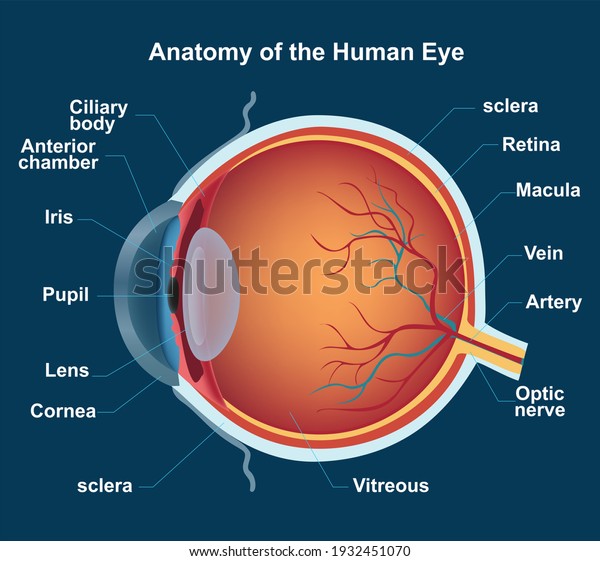
The anatomy of the eye
URL: https://www.shutterstock.com/image-illustration/3d-illustration-human-eye-parts-1932451070
2. But why do we need glasses??
We see many of our friends wearing glasses, but have you wondered why do they wear them?? Read further to understand why!
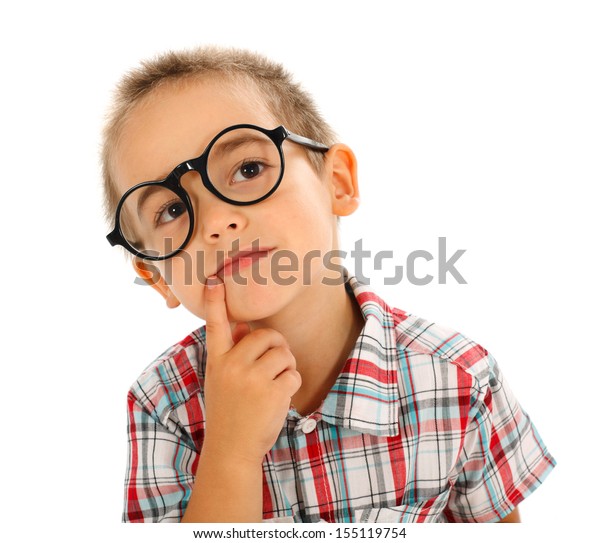
Why do we need glasses even though they look perfect?
URL: https://www.shutterstock.com/image-photo/wise-little-boy-thinking-wearing-big-155119754
Sometimes there are problems with the focusing system of the eye. This difficulty is caused due to the presence of any of the following eye conditions:
MYOPIA (Shortsight) – A person having this condition can see near objects clearly but needs minus lenses to see for distance.
HYPERMETROPIA (Longsight) – A person with this condition can see far objects clearly but need lenses to see for near. If left untreated for long or if the power is high then the person might develop difficulty visualizing far objects as well.
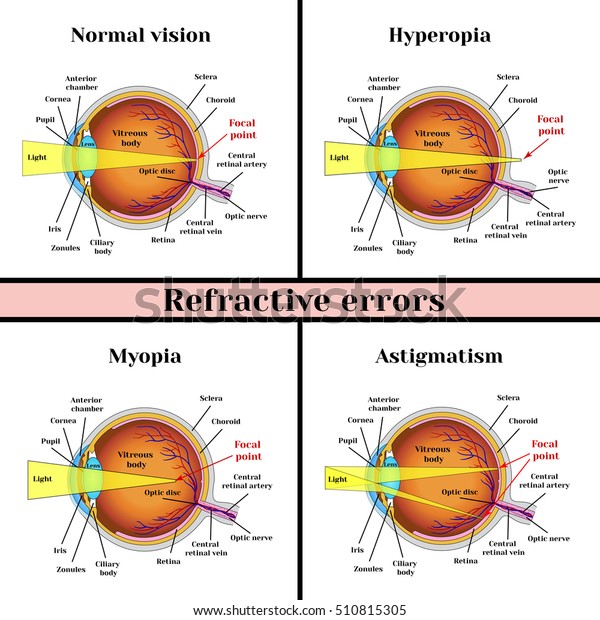
Figure 2: Types of refractive errors
https://www.shutterstock.com/image-vector/refractive-errors-eyeball-hyperopia-myopia-astigmatism-510815305
PRESBYOPIA (Old age sight)– The focusing power of the eyes starts decreasing in people who cross 40 years of age. Hence, they need reading glasses.
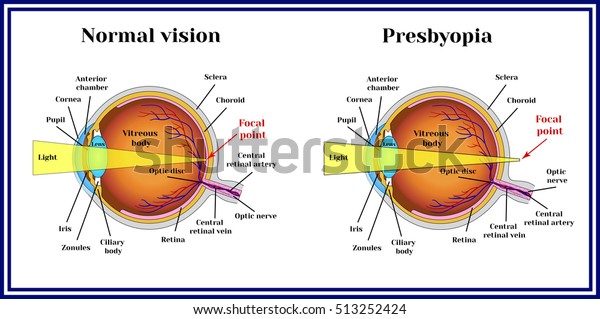
Normal vision versus Presbyopia
URL: https://www.shutterstock.com/image-vector/refractive-errors-eyeball-presbyopia-lens-loses-513252424
We must understand that wearing glasses does not mean your eyes are damaged. As long as wearing glasses gives you clear vision, your eyes are fine.
Often, we have seen that some children make fun of our friends who wear spectacles in school. We should understand that some of us have to wear glasses to see clearly and should never make fun of them. In future, even we may need to wear glasses, would you like anyone to make fun of you if you have to wear glasses?

Never make fun of your friends who wear glasses.
Everyone should get their eyes examined once a year. Sometimes a doctor can find a problem with your eyes even before you can. If these problems are not rectified on time, it can affect your learning, and your grades in school can keep falling due to poor performance in class.
If you have been advised to wear glasses then don’t worry!
Once you have a proper prescription for your eyes, you have to make glasses. Earlier, the spectacles lenses were made of glasses. Although they provide excellent clarity of vision, they are brittle and can break easily, causing severe eye injuries. Across the world, glass is being replaced by plastic lenses, which have good clarity of vision; they are very light and filter more of the damaging UV rays. The best advantage of a plastic lens is its impact resistance. It does not break easily and thus protects our eyes.
Polycarbonate is another material used primarily for kids. It is tougher than plastic and hence much safer for the eyes.
Some people fear that plastic gets scratched easily, which is true as it is softer than glass. Although if a good quality plastic is used, it can be made almost as hard as glass, and scratches on the lens won’t occur that easily.
We must make sure we wear your glasses regularly as advised to see clearly and to protect our eyes!
3. Fun with eyes
Many times, simple experiments can teach us more than a long lecture can. In this article, we will be learning about some fun and quick experiments to teach you more about your two extra-ordinary eyes.
Disappearing finger
Experiment:
- Extend both your arms in front of you. The back of the palms facing you and the thumbs joining each other, forefingers extended and other fingers folded (see picture).
- With your right eye closed, see the tip of your right finger using the left eye. YOUR LEFT FINGERTIP DISAPPEARS! (you can use the right eye to see the left finger also)

The disappearing finger
Reason – The image of the left finger falls on that part of the retina through which the nerve of the eye leaves the retina for the brain. This is a tiny part of the retina that cannot see and is known as the Blind Spot. When both the eyes are open, you do not see the blind spot generally as it is too small, and also, this non-seeing part of one eye is always overlapped by the seeing part of the other eye.
Hole in your palm
- Roll a paper to make a hollow tube of about 1-inch diameter.
- Hold it in front of your right eye with your left palm-held next to the roll at the far end. Bring the left palm closer to you, as shown in the picture. What do you see?

A HOLE IN YOUR LEFT PALM. OUCH! does it hurt? No, it doesn’t.
Reason: Since both our eyes function together, and the brain fuses the two images seen by the two eyes, in our experiment, the right eye sees the hole, and the left eye sees the palm. As the images are fused in the brain, we see a hole in the palm.
Play an eye doctor in your house
Everyone enjoys playing the doctor at home with a plastic doctor kit available in the toy shops. A little effort from your side can give you a more authentic feel of an eye doctor, and you can check your family’s vision along with your own in your house.
You will need a pencil, a scale, a black sketch pen and a white drawing sheet (Size A4).
Procedure:
- Draw two sets of horizontal lines on the drawing sheet, as shown in the figure. The separation of the top set of lines should be 7.5mm, and that of the lower set should be 5mm.
- Make evenly spaced squares by drawing two vertical lines spaced 7.5mm in the upper set and 5mm in the lower set. You should have two rows containing boxes of 7.5mm X 7.5mm in the upper row and 5mm X 5mm in the lower row.

Play an eye doctor in the house
- Draw letters of your choice in the squares, such that the strokes of your sketch pen are a little more than 1mm thick (1.5mm is accurate) for the upper row and 1mm thick for the lower row. Have as many letters as you wish.
- Finally, rub off the pencil outlines.
- Paste this chart on a wall in your house or the classroom.
- Place a chair in front of the wall such that the back of the chair is 11.5 feet from the chart.
Hey doctor, your clinic is now ready to see the first patient!
- Ask your patient to sit on the chair, close the left eye using any card and make them read the two lines.
- If your patient can read the bottom line, his vision is perfect. Suppose he can read only the top line and not the bottom line. In that case, his vision is acceptable, but better to get a professional eye examination done. And if he cannot read even the top line, refer him to a real eye doctor right away.
- Please do the same test for the left eye.
You can check your own vision the same way. Do this test every six months.
Older people often may have less than normal vision. Check their vision on the homemade eye chart, and together, in consultation with your parents, schedule their professional eye exam. At their age, they need their vision more than anyone else as reading is an essential part of their lives. Suppose the eye doctor cannot improve the vision, which has reduced because of old age. In that case, the optometrists may help them by giving special reading devices.
Some of the less fortunate of us may be blind. If you know such persons, you can read them their books, be their guide and help them to see through your eyes. (do you know that printers and computer software are available that scan the standard text that we can read and print it in Braille format, which a blind person can read). Not all is lost if you are blind. Diwakar Sharma was born blind but has achieved more than many of us can at that age. Helen Keller, a blind herself, wrote – “It is not miserable to be born blind, but it is miserable not to be able to endure blindness.”
4. Tips for good eye health
Eyes are one of the most special bod parts that require healthy food and healthy activities. We must try as hard as possible to live a healthy lifestyle and encourage the adults in the family to be healthy as well! Here are some Tips for you and your family:
• Eating carrots and spinach is good for general eye health
• Viewing TV or working on computers does not spoil the eyes if done in moderation and at safer distances (distance should be eight times the size of the screen)
• Read with enough light and at normal reading distances. (distance between your chin on your fist and book below your elbow)
• Instead of constantly reading at the end of every page, relax your eyes by looking at any far-off object for 20 seconds.
• Keep pointed objects away from your eyes. Never play with Bow and Arrows aiming at each other. Most eyes injuries are caused this way.
Eyes are not like a battery, to get exhausted if you use them excessively, so use them as much as you want and learn all you want to. Take care of your eyes; you only get one pair!
5. Ophthalmologists, Optometrists, Opticians: Who are they?
The doctors who take care of our eyes are called ophthalmologists. They are eye doctors who examine eyes, treat eye diseases and do surgeries.
Optometrists are vision care specialists, experts in refraction and visual system examination, prescribing glasses and contact lenses, making them ready, diagnosing, and treating binocular vision disorders.
Optician make glasses prescribed by Optometrists or Ophthalmologists.

Figure 7: Optometrists – The refraction magicians!
